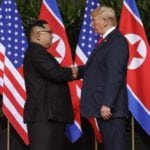 Our World
Our World  Our World
Our World  Crime
Crime 10 Dark Details of the “Bodies in the Barrels” Murders
 Animals
Animals The Animal Kingdom’s 10 Greatest Dance Moves
 Movies and TV
Movies and TV 10 Box Office Bombs That We Should Have Predicted in 2025
 History
History 10 Extreme Laws That Tried to Engineer Society
 History
History 10 “Modern” Problems with Surprising Historical Analogs
 Health
Health 10 Everyday Activities That Secretly Alter Consciousness
 History
History Top 10 Historical Disasters Caused by Someone Calling in Sick
 Animals
Animals 10 New Shark Secrets That Recently Dropped
 Movies and TV
Movies and TV 10 Forgotten Realities of Early Live Television Broadcasts
 Our World
Our World 10 Places with Geological Features That Shouldn’t Exist
 Crime
Crime 10 Dark Details of the “Bodies in the Barrels” Murders
 Animals
Animals The Animal Kingdom’s 10 Greatest Dance Moves
Who's Behind Listverse?

Jamie Frater
Head Editor
Jamie founded Listverse due to an insatiable desire to share fascinating, obscure, and bizarre facts. He has been a guest speaker on numerous national radio and television stations and is a five time published author.
More About Us Movies and TV
Movies and TV 10 Box Office Bombs That We Should Have Predicted in 2025
 History
History 10 Extreme Laws That Tried to Engineer Society
 History
History 10 “Modern” Problems with Surprising Historical Analogs
 Health
Health 10 Everyday Activities That Secretly Alter Consciousness
 History
History Top 10 Historical Disasters Caused by Someone Calling in Sick
 Animals
Animals 10 New Shark Secrets That Recently Dropped
 Movies and TV
Movies and TV 10 Forgotten Realities of Early Live Television Broadcasts
10 Mind-Blowing Wars That Nearly Happened
Our history has always been full of what-ifs, and war is no exception. It’s always fun to speculate what would have happened if this or that war had ever been fought. Last time we discussed the different military operations in World War II that would have hugely impacted history—if they had been implemented. World War II doesn’t have a monopoly on what-ifs. Here are several major wars from different timelines that almost happened, and could have forever re-written history.
10A British-Confederate Team-Up Against The Union
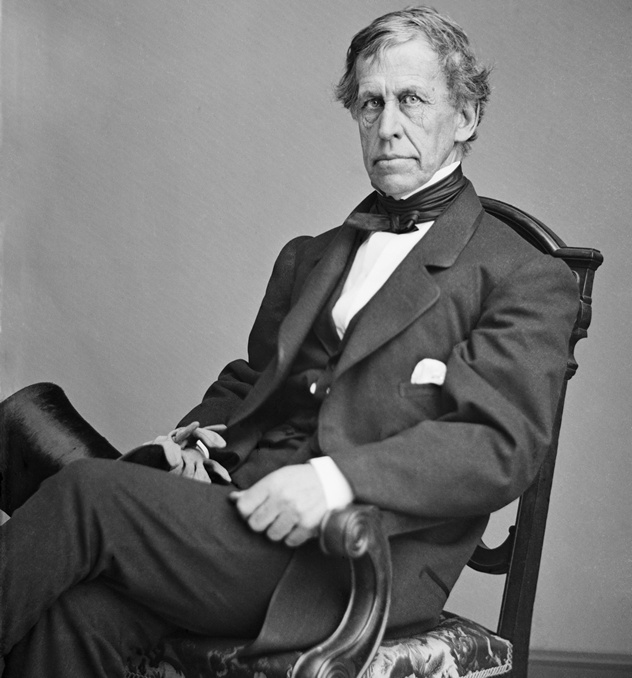
During the Civil War, the Union very nearly got into an armed confrontation with the British, thanks to one over-eager soldier. Charles Wilkes—a captain of the Union Navy—intercepted and detained two Confederate diplomats aboard the British ship, Trent. The diplomats were on their way to Britain in order to secure an alliance with the British.
News of the capture made Wilkes a hero in the Union. At the same time, it sparked anger among the British citizenry. The “Trent Affair”—as it came to be known to them—sparked calls for war if the Union did not apologize for the incident. To show that that they meant business, the British transferred 8,000 of their troops to Canada and rallied the Royal Navy for battle.
While most in the Union were also gung-ho for a war with Britain, President Lincoln knew better than to fight two wars at the same time. He quickly conducted a series of diplomatic overtures behind the scenes. He disowned Wilkes’s action and released the Confederate diplomats, but did not issue an official apology. Lincoln’s political savvy saved the Union and dashed the Confederates’ hopes of the British joining them.
9The French Wanted Australia

The Japanese were not the only ones hankering for a piece of the Outback. More than 100 years before the Japanese ever planned to take Australia, the Napoleonic French already had their eyes on the prized British settlement—according to a report uncovered by historians at the University of Adelaide.
The report was made by an 1802 Australia expedition led by the famed French explorer Nicholas Baudin. The chief author of the report—the expedition’s top scientist, Francois Peron—argued that the British colony (specifically Port Jackson in Sydney) could be utilized better by the French, instead of being a mere prison for exiled convicts. He added that the French should occupy, rather than destroy, the colony for future use. For the invasion, he suggested sending in at least 1,800 soldiers, who would later be supported by the prisoners, especially the Irish. According to Peron, it was imperative for the French to capture Sydney as swiftly as possible, in order to ensure the quick surrender of the surrounding settlements.
For reasons not yet concrete, the invasion never took place. Among historians, the general consensus for this non-event was the pivotal Battle of Trafalgar, in 1805. The French defeat at the hands of the British Navy seriously crippled their abilities to wage war on the high seas.
8The Sino-Soviet Crisis
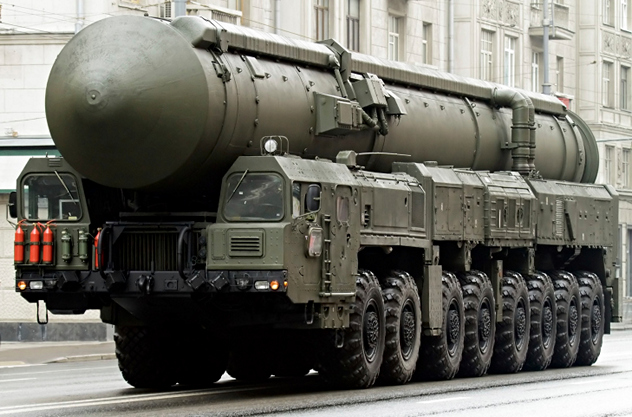
In the heyday of “Red Scares” and communist witch hunts that occurred during the Cold War, probably one of the greatest and most frequent misconceptions in the West was the belief that all communist nations were united in one giant “Communist monolith.” That notion couldn’t be further from the truth, as evidenced by the time when the world’s two largest communist countries—China and the Soviet Union—almost obliterated each other in the late 60s.
Other than the ideological split that shattered the unity between the Soviets and the Chinese in the 1950s, another thorn in their relationship were the numerous disputes along their shared borders. Although these disputes were often resolved without much violence, the worsening relations between the two countries finally culminated in shooting wars along their borders that started in March 2, 1969 and lasted for seven months. In that span of time, the world held its collective breath as both the Chinese and the Soviets seriously considered lobbing nuclear missiles at each other. The Soviets even asked the US for its opinion on the USSR going through with a pre-emptive strike.
Thankfully, cooler heads prevailed at the negotiating table, allowing the Soviets and the Chinese to settle their disputes peacefully. The communist fall-out became a boon to the West, especially to the Americans—it enabled them to approach and eventually establish warmer relations with the Chinese.
7The Soviets Almost Invaded Israel (Twice)

For all its people’s misfortunes throughout history, Israel was very lucky to have escaped destruction not once, but twice at the hands of the Soviet Union. During the Six-Day War, the Soviet Union informed the US that if Israel did not cease fighting immediately, it would be forced to protect its interests in the Middle East—a thinly-veiled threat to invade Israel.
Although it was largely dismissed as an empty threat, historians who closely studied the war later on found out that the Soviets were dead serious. They had already prepared their invasion force, complete with nuclear-armed planes and ships. Some historians also alleged that it was the Soviets who instigated the Six-Day War, in hopes of destroying Israel’s nuclear capabilities. If so, that plan was foiled due to the swift Israeli victory over the Arabs.
Another threat happened during the 1973 Yom Kippur War. Israeli forces were on the verge of destroying Egypt’s 3rd Army and bombarding Damascus with artillery, when they were ordered to cease all fighting. The order came after the Soviet Union made a threat to the US that they would “unilaterally intervene” if the war dragged on.
6The French And The British Nearly Fought Each Other Before World War I
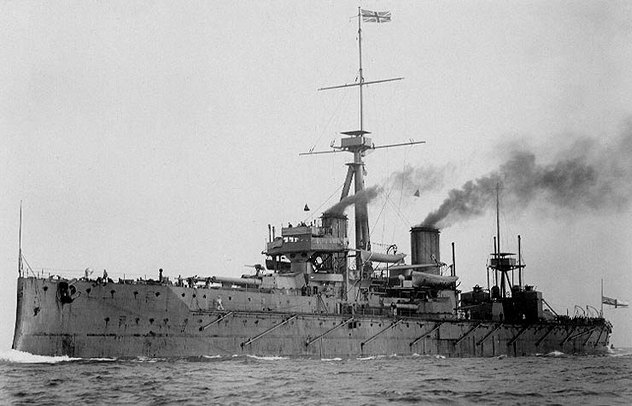
We can only imagine what would have happened if the British and the French went through with their private war, just before World War I—an event that came to be known as the Fashoda Incident. Both the British and the French wanted to expand their colonies in Africa and were looking for new areas to occupy. Fashoda, in Sudan, was the perfect place for them to link their respective colonies and form a contiguous African empire.
The French reached Fashoda on July 18, 1898, followed by the British two months later—a meeting that resulted in a very tense standoff. News of this quandary reached their respective home countries, and incited them to mobilize their navies. At this point, however, the French realized their navy was no match for the British, and instead negotiated for peace. The French Foreign Minister, Theophile Delcasse, also wanted an alliance with the British to counteract Germany’s influence on the continent. A month later, in November, the French discreetly pulled out of Fashoda, thereby ending the dispute and ensuring they remained allies with Britain during World War I. However, this wasn’t the only case of two future allies bickering before the Great War . . .
5The Russians And The British Almost Fought Too
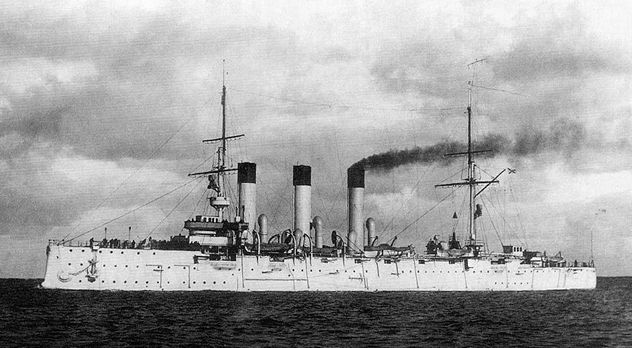
Probably one of the lowest points of British-Russian relations before the Soviet era occurred during the Russo-Japanese War in the 1900s, specifically in the infamous Dogger Bank Incident. In that incident, warships of the Russian Baltic Fleet passing through the North Sea engaged what they thought to be Japanese torpedo boats—which turned out to be British fishing vessels. (Apparently, it didn’t cross the Russian’s minds that the Japanese were in the Pacific, not the Atlantic.) The Russians sank one of the boats and killed two of the crewmen.
The incident spurred the British to rally against the Russians. British battleships tailed the Russian fleet in preparation for war. Only a timely apology from the Tsar and fair compensation for the victims saved the day for the Russians. Nonetheless, the Russian fleet’s voyage was a doomed one from the start—a few months after the incident, they were thoroughly annihilated by the Japanese navy in the Battle of Tsushima.
4Berlin Almost Became A Battleground (Again)
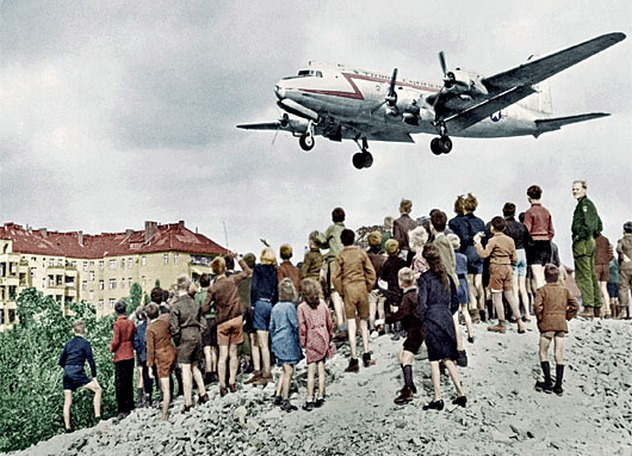
It seems fate wasn’t on the side of the Berliners who survived World War II. They had gone through a devastating war and were just looking to rebuild their lives, when yet another war of epic proportions threatened to engulf them during the infamous Berlin Blockade of 1948. The blockade—imposed by the Soviets on railways and roads leading to the Allied-held parts, in hopes of obtaining control over all Berlin—threatened to destroy the fragile peace that existed between the Russians and the Allies. For a while, it seemed that war was imminent—the hawks at the White House advocated military operations that included either sending an armed convoy to break the blockade or even dropping nuclear bombs on the Soviets.
Fortunately, the majority of the military chiefs and President Truman were against it, and instead began one of the biggest relief operations in history—the Berlin Airlift. For one year and three months, thousands of Allied planes flew countless sorties, and delivered badly-needed supplies to the isolated Allied areas. In the end, the Soviets had to call off their blockade, after they were embarrassed by their failure to completely take over Berlin.
3The India-Pakistani Standoff
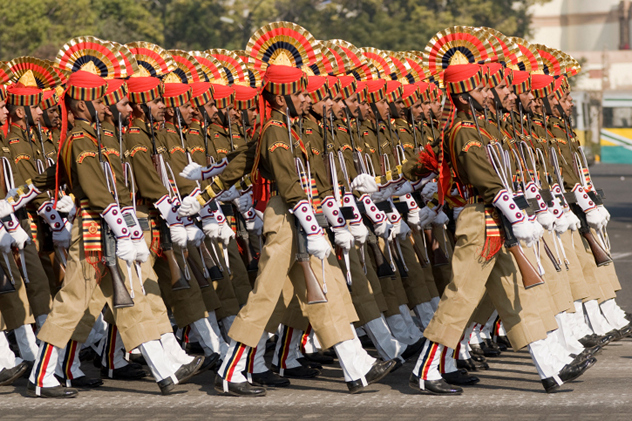
One of history’s most enduring and understated rivalries is the one between Pakistan and India. Since the 1940s, the two countries have fought four conventional wars and figured in at least “four disputes every five years.” All those conflicts, however, paled in comparison to the 2001–02 standoff between the two countries—a standoff that very nearly resulted in nuclear war.
The starting point of the standoff read like a Tom Clancy novel: A deadly Pakistani terrorist attack on India’s Parliament on October 1, 2001, left dozens dead and several more wounded. The terrorist attack—combined with a border war just two years earlier—enraged the Indian government enough to mobilize almost a million men along its shared border with Pakistan and demand swift justice. In response, the Pakistani military deployed several hundred thousand of its own armed forces. A tense, 10-month waiting game along their borders soon followed and was made all the more alarming by the presence of nuclear weapons. The Pakistani government even expressed their willingness to pre-emptively strike with nuclear missiles against the much-larger Indian military, if it became necessary.
Fortunately for both countries and the rest of the world, the crisis ended when the Indians decided to be the first to withdraw on October 16, 2002—a gesture returned by the Pakistanis shortly thereafter. Unfortunately, the threat of nuclear war didn’t deter the two countries from continuing their storied conflict, as exemplified by another standoff in 2008. (To be fair, it was terrorists who started that one.)
2The First And Second Taiwan Strait Crises Could Have Gone Nuclear
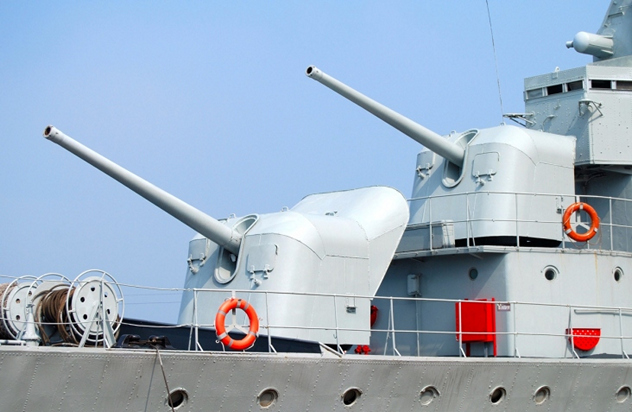
One of the issues that have continued to impede the US-China relations has been the existence of Taiwan. Since its inception in 1949, the tiny island of Chinese Nationalists has largely depended on the US for its continued survival against its much larger Communist neighbor. For the US, its continued protection of Taiwan almost resulted in nuking China twice.
The first time the US came close to launching nuclear missiles at China happened during the First Taiwan Strait Crisis, in 1954. The Communists subjected the Nationalists to intense artillery barrages. The US mobilized its forces towards the region, and seriously threatened the Communists with nuclear war if they did not stop firing. The second crisis did not differ much, with the US sabre-rattling its way to a de facto victory over the Communists.
That victory, however, was short-lived. The Chinese Communists realized they could not rely on the Soviets to bail them out in case of a nuclear conflict with the Americans, so they decided to build their own nuclear arsenal instead.
1A World War II One Year Earlier
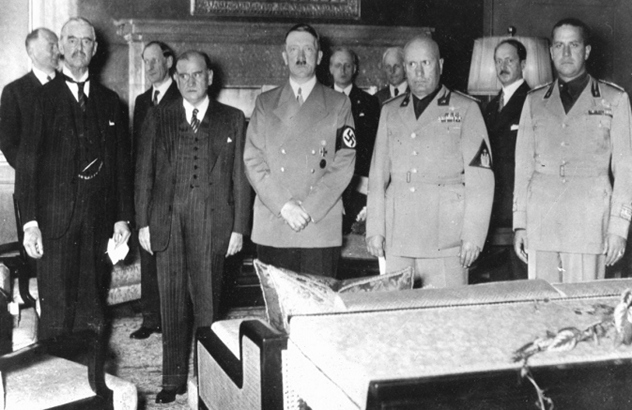
Most historians agree that World War II officially began when Nazi Germany invaded Poland on September 1, 1939. However, World War II could very well have started a year earlier, with the commencement of “Fall Grun” (Operation Green), Hitler’s planned invasion of Czechoslovakia. Although the Germans did eventually occupy Czechoslovakia virtually unopposed, a few months before World War II, it was a high-risk gamble.
For starters, Czechoslovakia was allied with France, Britain, Poland, and the Soviet Union. Germany would have fought a losing war right then and there—a stark reality that was painfully obvious to the leaders of the German military. In a secret meeting on August 4, 1938, they even planned to have Hitler arrested, if he ever followed through with the military operation. The arrest was to be made only if Britain and France also agreed to fight for Czechoslovakia. As Hitler’s luck would have it, the British and the French thought it better to appease him, and so gave his forces free rein to occupy Czechoslovakia. The rest, as they say, is history.
Marc V. is always open for a conversation, so do drop him a line sometime.
